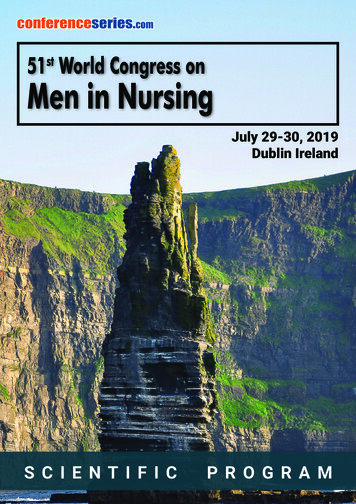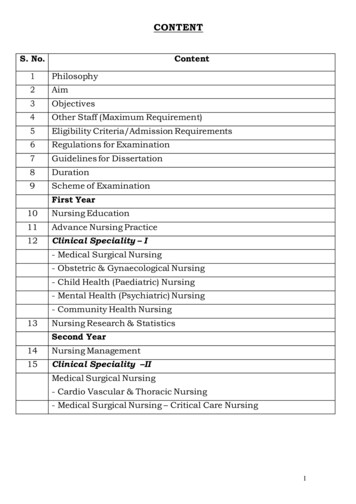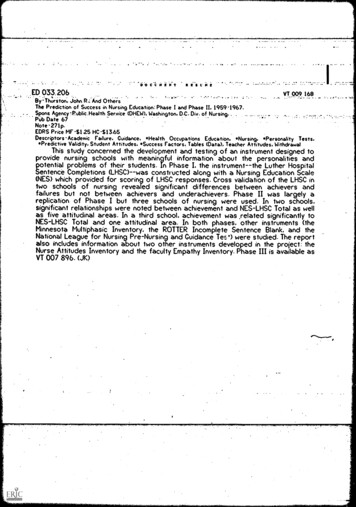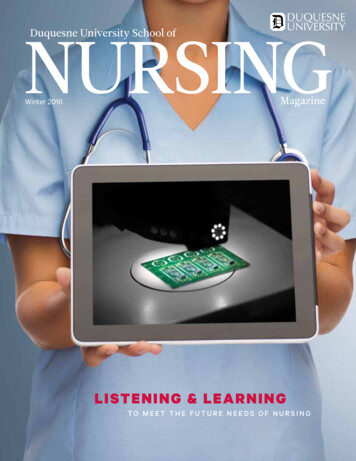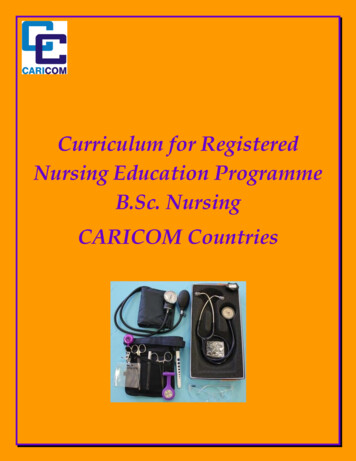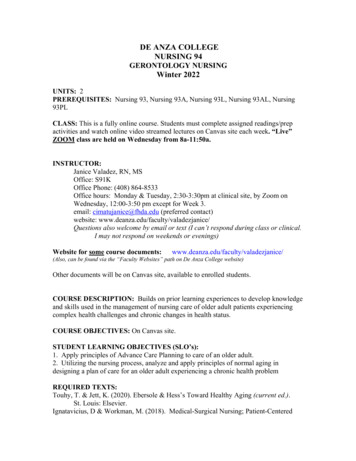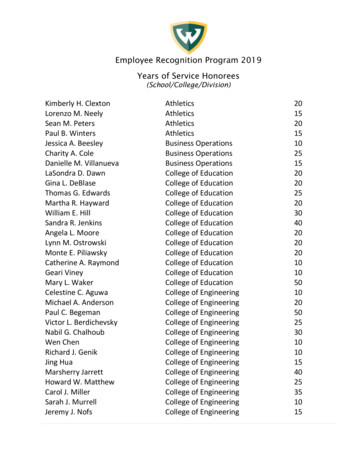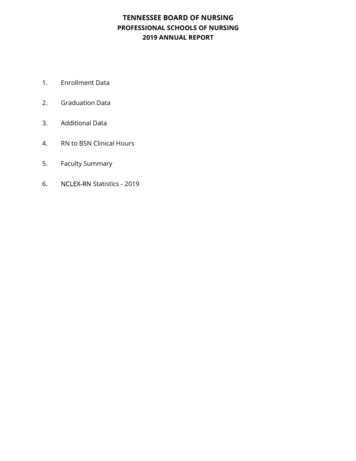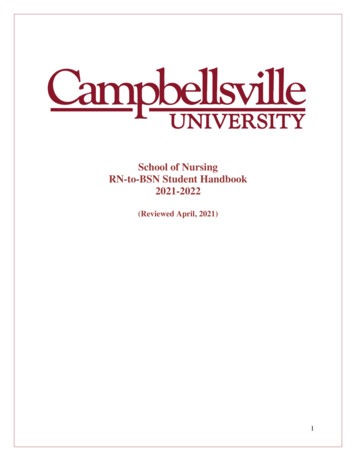
Transcription
School of NursingRN-to-BSN Student Handbook2021-2022(Reviewed April, 2021)1
Campbellsville University * RN-to-BSN Student HandbookRN-to-BSN Student HandbookTable of ContentsVerification of ReceiptMission Statement & STATEMENT OF BAPTIST HIGHER EDUCATION VALUESCurriculumCourse DescriptionsEnd-of-Program Student Learning Outcomes456710Policies and ProceduresAcademic PoliciesAdmission CriteriaAdmission ProcedureProgressionAt-Risk StudentsUse of TurnitinWithdrawalGraduation RequirementsCourse Substitutions for Transferred Credits1214161819202122Student ServicesStudent Services for Distance Education StudentsBadgett Academic Support ServicesUniversity Bookstore ServicesBusiness Office ServicesEmail CommunicationsFinancial Aid ServicesLibrary ServicesLearning Management SystemDisability Services232425272829303334Health and Safety RequirementsPracticum RequirementsClinical Requirements for PracticumAgreement to Comply with Clinical RequirementsProfessional Nursing Liability InsuranceStudent Identification in the Practicum Setting3536383940Student and Faculty Expectation PoliciesFaculty AccessibilityEvaluation of Student PerformancePracticum Dress CodeAPA Format414243442
Campbellsville University * RN-to-BSN Student HandbookExemplar for APAForum DiscussionsGrading ScaleNetiquette GuidelinesDisruptions of Internet ServiceAcademic HonestyCode of ConductComplaintsComplaint FormConfidentialityConflict of Interest: PracticumWeekly DevotionsEquipment Use PolicyEquipment Use Agreement4854555657585960616264666768Revised 1/17; Reviewed 5/17; Reviewed 2018; Reviewed 6/19; Revised 1/20; Reviewed 7/2020; Reviewed/Revised 4/20213
Campbellsville University * RN-to-BSN Student HandbookVerification of Receipt of the RN-to-BSN Student HandbookThe RN to BSN Student Handbook will be distributed through the online RN-to-BSN ResourceRoom and posted in the course room. Any questions or concerns that arise when reading thehandbook should be submitted to the student’s assigned advisor or to the RN-to-BSN ProgramCoordinator. Each course the student will post a statement in the designated area of the courseroom stating that they have read the handbook and all questions have been answered to thestudent’s satisfaction.Revised 06/2013; Reviewed 08/2014; Revised 8/2015; Reviewed 1/17; Reviewed 5/17; Reviewed 2018; Reviewed 6/19; Reviewed7/2020; Reviewed 4/20214
Campbellsville University * RN-to-BSN Student HandbookRN-to-BSN Mission StatementThe RN-to-BSN Program is committed to the mission of Campbellsville University. The missionof the RN-to-BSN Program is to offer a higher level of nursing education through an innovative,highly accessible curriculum. Tailored to the working adult, the program will provide an avenuefor the adult learner to further his or her education in a Christian environment. The program servesthe nurse through incorporation of professional values, improved interprofessional relationshipsand leadership qualities, and enhanced ability to provide care and health promotion for a diverseaggregate community. The program serves the community and the region through promotinglifelong learning and contributing to the profession of nursing and the health of society.A STATEMENT OF BAPTIST HIGHER EDUCATION VALUESCampbellsville University is committed to providing a quality educational experience within theBaptist tradition and in keeping with a strong Christian emphasis. Under the Lordship of Christ,the institution affirms historic Baptist principles including: the priesthood of the believer, theauthority of Scripture, freedom of conscience, integration of faith and learning, pursuit of truth inan academically challenging environment, student involvement in servant ministry, andaffirmation of others in a spirit of grace and love. While the University continues to maintainvery close ties to Baptist Churches and bodies, the institution exists to provide Christ-centeredhigher educational opportunities to a diverse student population. Campbellsville University,while Baptist in affiliation and Christ-based in practice, is neither a church nor an ecclesiasticalauthority. Since 1906 the institution has existed to provide higher educational opportunities tomen and women in a positive and academically challenging Christian environment. In that samespirit, we affirm the challenges and opportunities of Baptist higher education in the 21st Century.(Approved by Campbellsville University Board of Trustees on October 23, 2001)In compliance with A Statement on Baptist Higher Education Values as noted above,Campbellsville University affirms the historical religious exemption granted under the CivilRights Act of 1964, and other applicable federal and state statutes and regulations, as a Christianuniversity in the Baptist tradition, and to develop and implement all policies and proceduresrelative to employment practices and student and employee behavior to conform with thishistorical relationship to the Baptist church and the larger Christian community. These policiesand procedures will be the basis for the mission and activities of all campus organizations anduse of all Campbellsville University facilities.As God extended His love for all human beings through his Son Jesus Christ and as an institutionthat affirms the “whosoever will gospel of Jesus Christ” (John 3:16), Campbellsville Universityextends love for mankind through a commitment to the Great Commission (Matthew 28:16-20;Acts 1:8) and in the spirit of the Great Commandment (Matthew 22:36-40). Therefore,Campbellsville University will implement the development and administration of all policies andprocedures in the recognition of the diversity of God’s creation and His infinite grace toward allpeople.Reviewed 1/17; Reviewed 2018; Reviewed 6/19; Reviewed 7/2020; Reviewed 4/20215
Campbellsville University * RN-to-BSN Student HandbookCurriculum RequirementsADN Requirements (transferred) .42Area requirements from ADN transferred in minimum of 5 hours of Medical Surgical NursingGeneral Education Requirements (see catalog) 41Core Nursing Requirements . . . 24NUR 350 Advance Health AssessmentNUR 360 Transcultural NursingNUR 370 Community INUR 371 Community IINUR 380 Gerontology Nurse INUR 381 Gerontology Nurse IINUR 410 Leadership Cap4 credits4 credits3 credits3 credits3 credits3 credits4 creditsBSN Specific Requirements 16*May be included in general electives as noted above.CHE 100 – Introduction to Chemistry*(Preferred)(3 credits)CJ/ECO/PSY/POL/SOC 361 – Social Statistics3 creditsCJ/ECO/PSY/POL/SOC 362 – Research Methods3 creditsBIO 322 – Medical Microbiology with Lab4 creditsNUR 340– Nursing Informatics3 creditsTake one course from this list:3 creditsBA 300 – Contemporary Healthcare Management (3)BA 375 – Health Economics (3)BA 400 – Financial Management in Healthcare (3)Total Credits . 123 hoursReviewed 1/17; Revised 5/17; Reviewed 2018; Reviewed 6/19; Reviewed 7/2020; Reviewed 4.20216
Campbellsville University * RN-to-BSN Student HandbookCourse Descriptions for Core Nursing Requirements RN to BSN ProgramNUR350—Advanced Health AssessmentThis course is designed to further develop knowledge of the practicing nurse in the area ofadvanced health assessment. The course will focus on the comprehensive holistic health andphysical assessment of the client. Using evidence-based practice and quality improvementstandards the course will focus on the client’s physical, behavioral, psychological, spiritual,socioeconomic, and environmental parameters. The course will also promote health promotionand well-being of the individual, families, groups, and communities using developmentally andculturally appropriate approaches. The course will also incorporate evidence-based practices toguide health promotion and illness prevention objectives such as health teaching, healthcounseling, screening, outreach, disease and outbreak investigation, referral, and follow-upthroughout the lifespan. These evidence-based practices and interventions will be based oneffectiveness, efficiency, cost-effectiveness, and equity using compassionate, patient-centered,evidence-based care that is respectful to the client and the family and retaining their preferences.NUR360—Transcultural NursingThis course is designed to introduce the student to culturally competent nursing care across thelifespan. The course will identify different cultures and the health-illness attitudes, beliefs andpractices inherent in those cultures. Students will have assignments designed to enhance selfreflection and awareness of cultural orientation to enable a greater understanding of culturespecific care. Students will learn how to perform culturally-sensitive assessments with attentionto safeguarding, preserving, advocating and protecting diverse cultures in the healthcare setting.Students will focus on delivery of compassionate, patient-centered, evidence-based care thatrespects patient and family preferences.NUR370—Community Health Nursing IThis course is designed to further develop knowledge of the practicing nurse in the area ofcommunity health nursing. The course will focus on assessment of community health needs, useof evidence-based practice and quality improvement standards in promoting health and wellbeing of the individual, the family and the community. Basic public health concepts of thewellness-illness continuum, population needs, and prevention strategies will be incorporated intothe course. The course will also cover the public health nurse role and values-oriented decisionmaking, along with current cultural principles involved in providing such care.7
Campbellsville University * RN-to-BSN Student HandbookNUR371—Community Health Nursing IIThe purpose of this course is to apply the principles of community health nursing as learned inNUR370. Students will utilize the community assessment from the prerequisite course to build acommunity project in conjunction with a community health nurse in practice. Selected projectswill focus on the application of the nursing process to deliver competent care with families,communities, clients with developmental needs, and vulnerable populations. Students willidentify settings that are appropriate to community health nursing and care delivery methodsutilized within those settings. A 24- hour field practicum will be established with a communityhealth nurse to develop and implement a community-related health promotion activity.NUR380—Gerontology Nursing IThis course is designed to further develop the practicing nurse’s knowledge in the area ofgerontology nursing. The course will guide students in reflecting upon their own and society’sviews on aging, and specifically, how an aging population impacts the nation’s health policy andnursing care demands. Theories of aging and the physical and functional changes thataccompany aging will be incorporated into the nursing process for providing safe care andpromoting healthy practices in the older adult. Quality of life measures for the older adult livingwith chronic illness and transitioning through care settings will be emphasized.NUR381—Gerontology Nursing IIThe second course in gerontology nursing will focus on the older adult who has impairedphysical or functional changes. Older adults’ differing responses to illness are presented,including delirium states versus dementia. Case studies will explore acute and chronic states ofillness and how evidence-based practice and quality care can promote health, prevent furtherillness or complications, and restore and rehabilitate. Palliative care will also be addressed in thecourse.NUR410—Professional Nursing Leadership CapstoneThis course focuses on the role of the professional nurse as a leader and manager in a changinghealthcare delivery system. A solid foundation of decision-making, problem-solving, andcritical-thinking skills, as well as management and leadership skills needed to address themanagement-leadership problems in today’s Health care arena. Leadership and managementtheory is applied to clients at the primary, secondary, and tertiary levels of care. Critical thinking,research, and decision making in culturally diverse health care settings are discussed.Professional behaviors, economics of health care delivery, policy, ethical, legal, and selectedissues inherent in leadership and management are analyzed.8
Campbellsville University * RN-to-BSN Student HandbookThe course listed below is not a part of the nursing core, but is a related requirement for the RNto BSN Program:NUR 340—Nursing InformaticsThis course is designed to focus on the science and practice of fundamental informatics thatintegrates nursing its information and knowledge, with management information andcommunication technologies to promote the health of individuals, families, and communities.Reviewed 1/17; Revised 6/19; Reviewed 7/2020; Reviewed 4/20219
Campbellsville University * RN-to-BSN Student HandbookEnd-of-Program Student Learning OutcomesUpon graduation from the Campbellsville University RN-to-BSN Program, the student will:1. Demonstrate the professional standards of moral, ethical, and legal conduct.2. Provide knowledgeable, holistic nursing care to patients, families, and communitiesacross the lifespan.3. Promote collaborative care through intradisciplinary and interdisciplinary relationships inthe workplace and in the community to improve patient health outcomes.4. Distinguish the health care issues and health care needs of diverse cultures andpopulations, including those who are socially diverse.5. Develop an individualized plan to foster professional growth and development thatincludes evidence-based practice, lifelong learning, and professional engagement.6. Interpret the impact of healthcare policy, finance and regulatory environments, includinglocal, state, national and global healthcare trends, on nursing practice, health promotionand disease prevention.7. Develop a plan of care with measurable outcomes related to behavioral changetechniques to promote health and manage illness.8. Defend critical thinking decisions using scholarly inquiry and discussion with colleaguesand leaders in the nursing professionRevised 06/2013; Reviewed 08/2014; Revised 5/2015; Reviewed 1/17; Revised 5/17; Reviewed 2018; Reviewed 6/19; Reviewed7/2020; Reviewed 4/202110
Campbellsville University * RN-to-BSN Student HandbookStudent Policies and Procedures11
Campbellsville University * RN-to-BSN Student HandbookAdmissions Criteria for RN-to-BSN ProgramRationale: Campbellsville University School of Nursing recognizes that there are many entrylevels into the profession of nursing. The School of Nursing strives to enhance the professionalstatus of nurses through continued education that elevates the professionalism of the nurse.Policy:Students may apply for the RN-to-BSN program at Campbellsville University if they havecompleted an associate degree or diploma program for registered nursing and have a current,unencumbered license to practice nursing in their state of residence. Students must submitofficial transcripts from all previous colleges or universities for a transcript evaluation.Because of the nature of the RN-to-BSN Program, it is anticipated that students will be employedat least 20 hours per week as a registered nurse. Class discussion is enriched by the diverse workexperience of students at this level of education. Students who choose not to work whileenrolled in course work must discuss this option with the RN-to-BSN Program Coordinator priorto enrollment to establish how they will meet the requirements. New graduates who have not yetreceived their license may also apply, but will be conditionally admitted and will take nonnursing courses until the licensure process is completed.Effective in Fall, 2021: Students will be required to establish an account with the selecteddocument repository and upload specific required documents prior to acceptance into theprogram. This will ensure compliance with health requirements for practicums required withinthe program and compliance with expectations to avoid plagiarism within written assignments.Students will receive instructions to contact the Clinical Administrative Assistant for informationto access the document repository. The following documents are required for admission to theprogram:1. A background check—A one-time criminal background check will be required of allstudents to be available to potential clinical practicum sites in order to comply with theiraccreditation standards.2. Current, unencumbered registered nurse licensure in the state of residence or the statewhere practicum activities will occur. (For most students this will be Kentucky, but forothers who may live or practice out-of-state, the current license that is appropriate to thepracticum site will be uploaded.)3. Proof of a negative tuberculosis and TB Assessment Form—PPD skin test or chest Xray demonstrating absence of disease. If you are a positive PPD reactor, you must submitdocumentation showing a chest X-ray or INH treatment dates demonstrating completionof the prophylaxis medication. (This must be updated annually while in the program.)12
Campbellsville University * RN-to-BSN Student Handbook4. Influenza Vaccine—required to have each fall of the year. (Must update annually.)[Note: As other essential vaccines are required by clinical facilities, (i.e., COVID-19 orothers), these may be added as a requirement according to directions from the Centers forDisease Control and Prevention and requirements from participating clinical facilities.]5. Agreement to comply with clinical requirements of specified facility—The statedrequirements above must be met upon entry into the program. Additional clinicalrequirements may be mandated by individual clinical facilities utilized for practicumexperiences. Students must agree to adhere to specified clinical requirements in a timelymanner, in order to participate in practicum and meet the learning objectives withpracticum courses. Student signature on “Agreement to Comply” form (which will beprovided in the repository) is required.6. Plagiarism Certificate—Students will complete tutorials and practice tests designed toinform about plagiarism before taking a certification test. This training is providedthrough Indiana University at .html Afterpassing the certification test, students mut click on a button to request a certificate, whichwill be sent to the student’s email address. This certificate must be uploaded into therepository. (The certification test must be updated annually while in the program.)Adopted 02/01/2012; Revised 06/18/2013; Reviewed 08/2014; Revised 5/2015; Reviewed 1/17; Reviewed 5/17; Reviewed 2018;Reviewed 6/2019; Reviewed 7/2020; Reviewed/Revised 4/202113
Campbellsville University * RN-to-BSN Student HandbookAdmissions ProcessRationale: This policy is developed to ensure seamless transition into the BSN Program and toguide the student to necessary resources for admission to Campbellsville University and to theSchool of Nursing.Policy:The applicant must complete applications for admission to Campbellsville University and to theSchool of Nursing. These applications are available online at www.campbellsville.edu/rn-tobsn-students. By completing the required applications online, the student avoids the nonrefundable application fees associated with hard-copy application forms.1. Admission to the University and the School of Nursing:The application captures data required by the University admission staff and helps toestablish the student’s chosen major: Bachelor of Science in Nursing (BSN). Additionalinformation needed by the School of Nursing such as licensure and employment historywill also be obtained at this time.2. Official TranscriptsOne Transcript from Each School Attended!TranscriptsProvide one official copy of all transcripts from each college or university that you have attendedpreviously. Once you apply, you will receive a copy of our official transcript request form fromyour Enrollment Counselor. Please submit this form via fax to 1-800-473-2512 or via email totranscripts@learninghouse.com.If you would like to mail an official, sealed copy, please send to our transcript processors at:Campbellsville University C/O The Learning House801 East Park Drive, Suite 105Harrisburg, PA 17111Please contact our online Enrollment team at 888-244-0609 or via email atonline@campbellsville.edu or Michele Dickens, PhD, RN, at (270) 789-5239 or emailmrdickens@campbellsville.edu if you have questions or are unable to access any of the abovedocuments.3. Licensure Information14
Campbellsville University * RN-to-BSN Student HandbookA copy of a current, valid, unencumbered RN license, or listing on a state licensing boardwebsite must be submitted. All licenses will be verified before admission into theprogram and every year as long as the student is in the program. List your RegisteredNurse license, expiration date, and state board granting the license on the application.4. Letter of AcceptanceAfter evaluation of submitted materials, students will receive confirmation of acceptanceinto the RN-to-BSN Program from the University. Students will be contacted by anadvisor who will assist in preparing a program plan and registering for classes.Concurrent Enrollment ProgramStudents who participate in the Concurrent Enrollment Program may take general educationcourses and BSN-specific courses (CHE 100; SOC 361 and 362; BA 300/375 or 400; and NUR340) while enrolled in the associate degree program. These students will matriculate into BSNcore nursing coursework upon completion of the associate degree and successful completion ofthe NCLEX-RN.Adopted 02/01/2012; Revised 06/18/2013; Reviewed 08/2014; Revised 5/2015; Reviewed 1/17; Reviewed 5/17; Reviewed 2018;Reviewed 6/2019; Reviewed 7/2020; Reviewed 4/202115
Campbellsville University * RN-to-BSN Student HandbookCourse Progression PolicyRationale: To establish expectations of student performance within the RN-to-BSN Program.Policy:In order to progress through the RN-to-BSN Program, the student must meet certain guidelines:1. The student must earn a C or higher in each course in the core curriculum and guidedelectives in the BSN area in order to demonstrate achievement of End-of-ProgramStudent Learning Outcomes.2. Student must achieve a GPA of 2.5 or higher by the end of his/her third core nursingcourse after entering the program.3. If the student’s GPA drops below 2.5 during the course of study, the student will beplaced on academic warning and may not take more than one core nursing course duringa given term. The student will have two consecutive eight-week semesters to bring theirGPA up to the acceptable level of 2.5.4. If the student’s GPA drops below 2.5 a second time, the student will be placed onacademic suspension.Faculty has adopted a new course order for progression that will help to guide students throughthe program. This order is suggested to ensure success of students based on recommendations ofthe accrediting body and on identified characteristics of the courses. Exceptions may be made bythe Dean or the Director of the BSN completion program.Suggested Progression of Courses:Fall (Admit)FallSpringSpringSummerSummerndstndst1st Bi-term2 Bi-Term1 Bi-Term2 Bi-Term 1 Bi-Term2nd Bi-TermNUR 340NUR 350NUR 370NUR 371NUR 360BA 300 SOC 361SOC 362NUR 380NUR 381BA 300 NUR 410FallFallSpring (Admit) SpringSummerSummer1st Bi-term2nd Bi-Term1st Bi-Term2nd Bi-Term 1st Bi-Term2nd Bi-TermNUR 380NUR 381NUR 340NUR 350NUR 370NUR 371NUR 360NUR 410SOC 361SOC 362BA 300 BA 300 stFallFallSpring 1 BiSpringSummer (Adm) Summerndnd1st Bi-term2 Bi-TermTerm2 Bi-Term 1st Bi-Term2nd Bi-TermNUR 370NUR 371NUR 380NUR 381NUR 340NUR 350BA 300 BA 300 NUR 360NUR 410SOC 361SOC 362Additional courses will be added as needed based on students’ personalized degree audit.16
Campbellsville University * RN-to-BSN Student Handbook*NUR 380/381 and NUR 370/371 may be interchanged dependent on the student’s preferenceand availability of courses. Both of these grouped courses are deemed to be of relevantly equaldifficulty and are independent of one another in subject matter.*NUR 410 is the capstone course and should be taken last prior to graduation. Exceptions maybe made by the Dean or the RN-to-BSN Program Coordinator.Adopted 02/01/2012; Revised 06/18/2013; Reviewed 08/2014; Revised 5/2015; Reviewed 1/17; Revised 5/17; Reviewed 201;8Reviewed 6/2019; Reviewed 7/2020; Reviewed 4/202117
Campbellsville University * RN-to-BSN Student HandbookPolicy: At-Risk StudentsRationale: The RN-to-BSN Program at Campbellsville University seeks to promote success forall students within the program. By identifying at-risk students early, faculty can provideguidance to help students overcome barriers to success.Policy: In an online course, much of the success or lack of success is identified through activeparticipation in course activities. Students who are deemed to be at-risk for failure are studentswho are not actively engaged in the course room or who start out the academic term with lowerscores on assignments, appearing to not understand the expectations of the course. Notedabsence in the course room demonstrates additional cause for concern.Instructors will monitor the progress of students through each class, using formative andsummative means to identify learning issues. When students are unsuccessful in assignmentsused to assess learning in the classroom, instructors will counsel these individuals to determinefactors that may impact learning. Potential barriers to learning may include study habits,excessive work schedules, family obligations, testing issues such as anxiety, or other factors. Thenursing instructor will help the student to identify potential barriers to learning and will advisethat student accordingly.C.A.R.E. Alert FormFaculty are encouraged to use C.A.R.E, Early Alert System to initiate response to barriers/factorsthat hinder student success. The alert system addresses multiple factors that may impact studentsuccess, including attendance, academic progress, general concerns (incivility, low participation,lack of attention to study, time management, poor quality work, missing required textbook, etc.),financial concerns, academic dishonesty. Faculty completes the form electronically in Tigernet(found under “Forms,” “Academics”). Upon receipt of a C.A.R.E form, Academic Support willcontact the student’s advisor to create a “success net” to assist the student in dealing withwhatever issues are causing the student to fall behind. Faculty is advised that if a concern meritsimmediate attention notify appropriate emergency personnel immediately.Attendance FormDue to the nature of the 8-week course, attendance (participation in the course) is very importantto student success. Faculty should submit an absence template to Academic Support after oneweek (12.5% of the scheduled classes) without participation/contact from the student. Thisprompts the issuance of an official warning to the student. After the second week (25% of thescheduled classes) without participation/contact by the student, faculty must submit another formindicating additional absence. At this point the student will fail the course and beadministratively withdrawn from the course. (Attendance form can be found in Tigernet under“Academic Affairs,” “Forms and Documents-Faculty.”)Campbellsville University provides counseling services that can assist the student with suchissues and with striking a balance between school, work and issues as those noted above.As deemed appropriate by the instructor, the student may be referred to the Office ofCounseling Services by completing a referral form and contacting this office for anappointment.Adopted 4/202118
Campbellsville University * RN-to-BSN Student HandbookPolicy: Use of Turnitin Rationale: Campbellsville University participates in the Turnitin assessment tool to ensurequality, campus-wide assessment of written work. The tool helps to ensure that students’ work isoriginal. Students can then have confidence in the work and have consistent and fair feedbackfrom a reputable source.Policy: Students are required to submit written assignments to the Turnitin link housed withinthe assignment as determined by faculty. Students are encouraged to review the similarity reportto identify potential occurrences of plagiarism. This affords students the opportunity to correctthese items prior to submission for grading in the designated location within the assignment.Faculty has adopted a similarity score maximum of 30% matching text that is deemedacceptable.Procedure:1. Faculty will place information related to the use of Turnitin in the syllabus and in thecourse room for student access. Faculty has adopted the following statement for inclusionin the syllabus:Students are required to submit selected written assignments as designated by facultywithin each course to Turnitin prior to submitting the assignment in the course room linkfor final grading. Turnitin instructions and tutorial are available in the course room.Students must score 30% or less on the matches for written work to be acceptable.Material flagged in Turnitin must be appropriately cited within the paper using APAformat.2. Turnitin Instructions should be listed in the resources within the course room. The use ofthis tool allows students to review scores for matching prior to final submission andallows faculty to review scores/matches to determine if threshold has been exceeded.3. APA resources should be listed in the course room for students to access, including theAPA Exemplar Checklist.4. Faculty must determine a timeline within the course for submission to Turnitin;subsequent changes that need to be made to the document and r
The RN to BSN Student Handbook will be distributed through the online RN-to-BSN Resource Room and posted in the course room. Any questions or concerns that arise when reading the handbook should be submitted to the student's assigned advisor or to the RN-to-BSN Program Coordinator.


